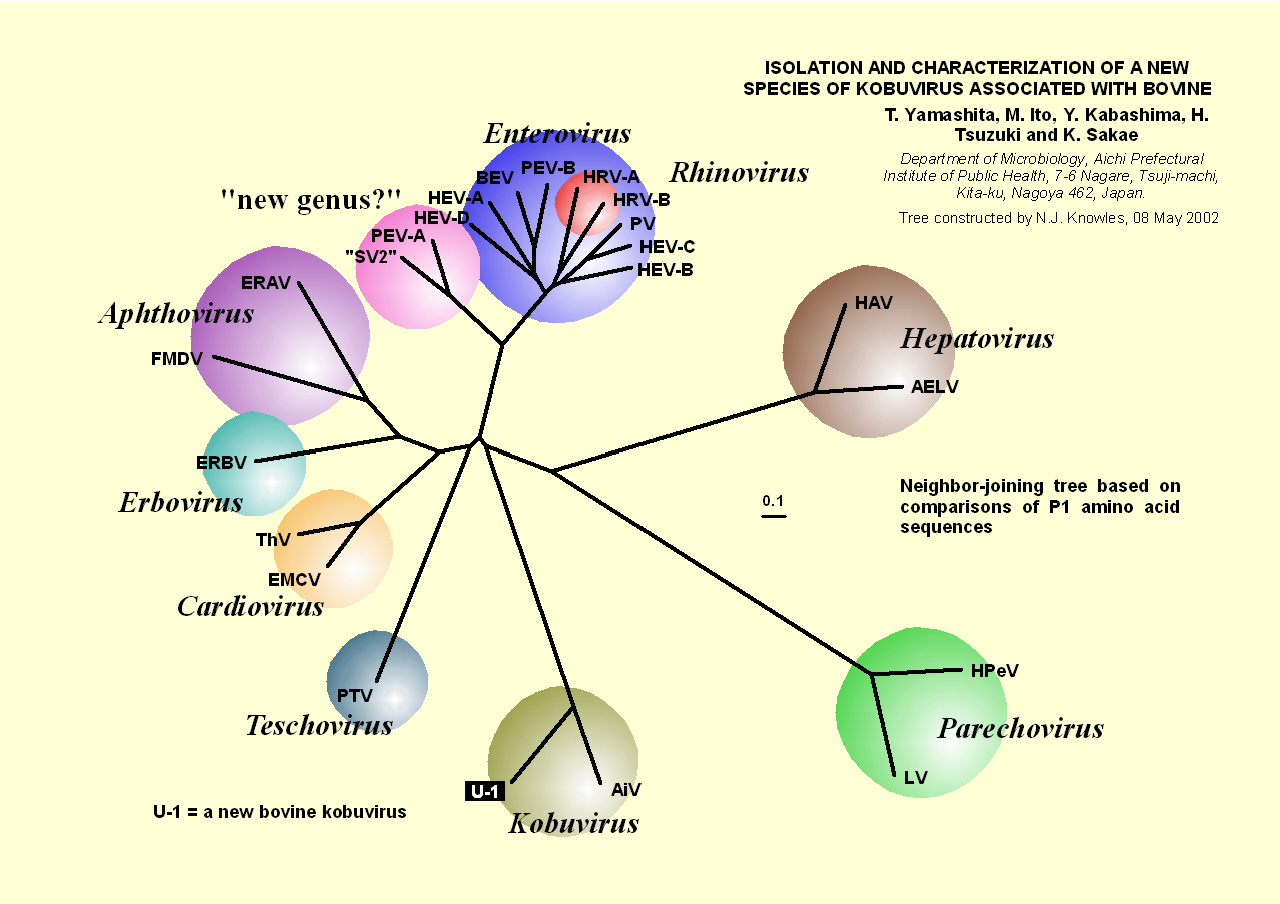The
Picornavirus
Pages

|
Child level |
|
Same level |
|
|
|
Genera |
|
|
The Discovery of Bovine KobuvirusesN.J. KnowlesThe Pirbright Institute, Pirbright Laboratory, Ash Road, Pirbright, Woking, Surrey, GU24 ONF, United Kingdom. Posted: 19 November 2002; Updated: 26 October 2003 In a discussion that I had with Dr. Ian Clarke (University Medical School, Southampton General Hospital) on the 17 April 1997 he told me of a PCR product that had been amplified in his laboratory from bovine faecal material (which had been obtained from David Snodgrass of the Moredun Institute). EM examination had revealed that this specimen contained particles resembling caliciviruses. Dr. Clarke had tried RT-PCR using calicivirus primers, but had no success. They then tried amplification using picornavirus polymerase primers and managed to obtain an amplicon. Sequencing of this small polymerase region yielded a sequence which appeared to be picornavirus-like, but which didn't match closely any known sequences. I received the translated amino acid sequence (the original nucleotide sequence appears to have been lost) on the 21 April 1997 and confirmed that it was indeed a picornavirus-like sequence. In July 1998, the sequence of Aichi virus became available on the GenBank/EMBL databases (AB010145) and comparisons revealed that the "bovine calicivirus" sequence was related to Aichi virus. With Ian Clarke's permission the ICTV Picornaviridae Study Group included a phylogenetic tree of showing the relationship of the "bovine calicivirus" sequence to the known members of the picornavirus family (Fig. 1; King et al., 1998). It should be noted that Ian Clarke had seen an abstract which had been presented at an unknown symposium (a friend had sent him a photocopy) describing Aichi virus; because of the description of the viral properties he wondered at the time if his "bovine calicivirus" could in fact be related to Aichi virus.
Fig. 1. Neighbor-joining tree of the partial 3D polymerase region based on amino acid similarity matrices illustrating i) the relationship of porcine enterovirus type 8 (J.H. Peng, F. Lin and N.J. Knowles, unpublished data) to the entero- and rhinovirus genera and ii) the relationship of a sequence obtained from a supposed bovine enteric calicivirus (I.N. Clarke, personal communication, 1997) to the newly described Aichi virus (Fig. 4 from a poster by King et al., 1998). Recently, Dr. Teruo Yamashita communicated to me the fact that they had identified a bovine kobuvirus related to, but distinct from Aichi virus. They have now sequenced the complete genome (AB084788; Yamashita et al., 2003) and the relationship of its P1 capsid region to that of other picornaviruses is shown in Fig. 2.
Fig. 2. The relationship of the bovine kobuvirus U-1 to other members of the Picornaviridae. The partial 3D amino acid sequences of Aichi virus and the two bovine kobuviruses (U-1 from Japan and the so-called "bovine calicivirus" or BCV from Scotland) are shown in Fig. 3.
Fig. 3. Alignment of the partial 3D polymerase sequences of kobuviruses.
AcknowledgementsI would like to thank Ian Clarke and David Snodgrass for the "bovine calicivirus" data and Teruo Yamashita for the Aichi virus and U-1 virus data. ReferencesKing, A.M.Q., Brown, F., Christian, P.D., Hovi, T., Knowles, N.J., Lemon, S.M., Minor, P.D., Palmenberg, A.C., Skern, T. and Stanway, G. (1998). Picornavirus taxonomy: seventh ICTV report, species, and other issues. Europic '98: Xth Meeting of the European Study Group on the Molecular Biology of Picornaviruses, Friedrich Schiller University, Jena, Germany, 5-11 September 1998. Download the poster as a PDF file. Yamashita, T., Ito, M., Kabashima, Y., Tsuzuki, H., Fujiura, A. and Sakae, K. (2003). Isolation and characterization of a new species of kobuvirus associated with cattle. J. Gen. Virol. 84: 3069-3077. [Aichi Prefectural Institute of Public Health, Department of Microbiology; 7-6, Nagare, Tsujimachi, Kita-ku, Nagoya, Aichi 4628576, Japan. E-mail: tyamashita@hi-ho.ne.jp; Tel: 81-52-910-5674; Fax: 81-52-913-3641]
|


